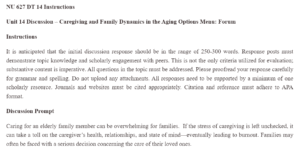Caregiving and Family Dynamics in the Aging Options
Several strategies have been implemented to help families deal with the stress and anxiety associated with caregiving. Family members need to attend to their own physical and mental health (Whitlatch & Orsulic-Jeras, 2018). They can do this by visiting a doctor for regular checkups. A mental health professional can evaluate the stress associated with caregiving and suggest strategies that can help minimize stress and burnout. In addition, caregivers can attend to their physical and mental health by being involved in activities that make them feel relaxed (Gérain & Zech, 2018). Such activities include surfing the internet, watching television, listening to music, and meditating. These activities can make caregivers feel disconnected from caregiving, thus reducing stress. Caregivers can also join support groups that can provide emotional support (Anclair et al., 2018). Such groups can help them to vent their feelings, and individuals facing similar situations can share ideas. Joining a group of caregivers that handle older adults with the same disease, such as Alzheimer’s disease, can help caregivers get ideas on how to plan themselves without getting stressed.
I can help family caregivers make decisions about the care of their loved ones by assisting them in sorting out important information that can help them care for their family members. Not all caregivers have the necessary information to care for their family members (Bilodeau et al., 2019). Helping them get such information from health care professionals such as physicians can help them make better decisions regarding the care of their loved ones. In addition, I would recommend resources that can help them get information on how to take care of their family members.
Advance directives have a significant impact on the decisions caregivers make when taking care of their loved ones. Helping family caregivers to handle advance directives can relieve them of unnecessary pressure (Zenz & Zenz, 2017). Therefore, I can either create advance directives or help family caregivers make alterations to advance directives to assist them in making better decisions about caring for their loved ones. My role in creating advance directives would be promoting the exploration and identification of values and providing education.
References
Anclair, M., Lappalainen, R., Muotka, J., & Hiltunen, A. J. (2018). Cognitive behavioural therapy and mindfulness for stress and burnout: a waiting list controlled pilot study comparing treatments for parents of children with chronic conditions. Scandinavian Journal of Caring Sciences, 32(1), 389–396. https://doi.org/10.1111/scs.12473
Bilodeau, G., Witteman, H., Légaré, F., Lafontaine-Bruneau, J., Voyer, P., Kröger, E., Tremblay, M. C., & Giguere, A. M. C. (2019). Reducing the complexity of patient decision AIDS for community-based older adults with dementia and their caregivers: Multiple case study of Decision Boxes. BMJ Open, 9(5), 1–19. https://doi.org/10.1136/bmjopen-2018-027727
Gérain, P., & Zech, E. (2018). Does informal caregiving lead to parental burnout? Comparing parents having (or Not) children with mental and physical issues. Frontiers in Psychology, 9(JUN), 1–10. https://doi.org/10.3389/fpsyg.2018.00884
Whitlatch, C. J., & Orsulic-Jeras, S. (2018). Meeting the Informational, Educational, and Psychosocial Support Needs of Persons Living with Dementia and Their Family Caregivers. Gerontologist, 58, S58–S73. https://doi.org/10.1093/geront/gnx162
Zenz, J., & Zenz, M. (2017). Survey on German Palliative Care Specialists’ Experiences with Advance Directives. Pain and Therapy, 6(1), 17–28. https://doi.org/10.1007/s40122-016-0063-0
ORDER A PLAGIARISM-FREE PAPER HERE
We’ll write everything from scratch
Question
Caregiving and Family Dynamics in the Aging Options
NU 627 DT 14 Instructions
Unit 14 Discussion – Caregiving and Family Dynamics in the Aging Options Menu: Forum
Instructions
It is anticipated that the initial discussion response should be in the range of 250-300 words. Response posts must demonstrate topic knowledge and scholarly engagement with peers. This is not the only criteria utilized for evaluation; substantive content is imperative. All questions in the topic must be addressed. Please proofread your response carefully for grammar and spelling. Do not upload any attachments. All responses need to be supported by a minimum of one scholarly resource. Journals and websites must be cited appropriately. Citation and reference must adhere to APA format.
Discussion Prompt

Caregiving and Family Dynamics in the Aging Options
Caring for an elderly family member can be overwhelming for families. If the stress of caregiving is left unchecked, it can take a toll on the caregiver’s health, relationships, and state of mind—eventually leading to burnout. Families may often be faced with a serious decision concerning the care of their loved ones.
- Discuss strategies that are proven to help families deal with caregiver stress and burnout.
- How can you assist them in making decisions about the care of their loved ones?
- Include a discussion on handling advance directives with families.
- Document your discussion with at least five evidence-based references on the topics.
Responses must address all questions’ components, demonstrate critical thinking and analysis and include peer-reviewed journal evidence to support the student’s position.
Please be sure to validate your opinions and ideas with citations and references in APA format.

